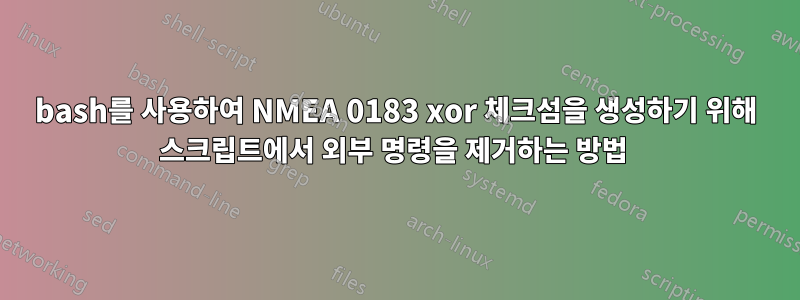
최근에 bash를 사용하여 NMEA 0183 체크섬을 생성하고 확인해야 했는데 필요한 것을 정확히 달성하기 위해 작성된 문서를 많이 찾을 수 없었습니다.
NMEA 0183 문장은 $로 시작하여 *와 $와 * 사이의 모든 바이트의 16진수 XOR인 두 문자로 끝납니다. 예:
$INGGA,230501.547,2118.97946,N,15752.60495,W,2,08,1.1,5.17,M,,,0,0001*02
이 유틸리티는 문자열을 16진수로 변환하고 xor로 변환합니다. 이미 존재하는 체크섬을 확인하거나 생성 중인 NMEA 문장의 끝에 대한 체크섬을 생성하는 데 사용할 수 있습니다(공급한 문자열에서 $ 및 *..를 제거합니다).
#!/bin/bash
# =========================================================
# Reads a NMEA 0183 sentence and calculates the proper
# XOR checksum for the end.
# Will accept a string with or without a checksum on
# the end or $ on the front and calculate what the checksum
# should be.
# Sentence can be read as an argument but must be single quoted
# or preceded by a \ or the shell will try to interpret the
# talker as a variable and the result will be incorrect.
# Examples:
# xor '$INHDT,207.7,T*27'
# xor \$INHDT,207.7,T*27
# xor INHDT,207.7,T
# If run with no arguments, will prompt user for data. No
# quotes or backslash is needed then.
# Depends: xxd sed
# ===T.Young 09/2016=======================================
set -o pipefail
set -o errexit
set -o nounset
# Functions
# =========
depcheck() { # Checks that necessary external commands are present
# and executable
local DEPENDS="sed xxd"
for PROG in $DEPENDS; do
[[ -x "$(command -v $PROG)" ]] || {
echo "$PROG MISSING! Exiting."
exit 0
}
done
}
x_or() { # Here is where the magic happens
# The next two lines strip out $ characters, or an
# * and anything after it (checksum)
HEAD="${SENTENCE%\**}"
TAIL="${HEAD//\$}"
# Convert ASCII string into hex and read into an array.
# Each element in the array gets preceded by "0x"
HEXVAL="$(xxd -pu <<< ${TAIL})"
HEXARRAY=($(printf '%s' "${HEXVAL%0a}" | sed -e 's/../0x& /g'))
# Loop through the array and do the xor, initially start $XOR at 0
for (( x=0; x<"${#HEXARRAY[@]}"; x++ )); do
XOR=0x$(printf '%02x' "$(( ${XOR:-0} ^ ${HEXARRAY[$x]} ))")
done
# Strip off the 0x from the result
CLEAN=${XOR#0x}
printf '%s\n' "${CLEAN^^}"
}
main() {
case "${1:-}" in
"") # No input specified, read from stdin
depcheck
read -r SENTENCE
x_or
;;
*) # Input was provided, use that
depcheck
SENTENCE="$1"
x_or
;;
esac
}
# Main
# ====
main "$@"
쉘 스크립팅을 할 때 나는 항상 외부 프로그램, 심지어 sed나 xxd와 같은 일반적인 프로그램의 사용을 제거하는 방법을 찾으려고 노력합니다. 쉘 내장 기능만 사용하여 위의 작업을 수행하는 방법을 아는 사람이 있으면 알려주십시오.
업데이트: Sato의 방법을 고려한 새로운 기능이 있습니다. 이를 통해 외부 프로그램 호출과 위의 관련 depcheck 기능을 완전히 제거할 수 있습니다.
x_or() { # Create a hex XOR checksum of all the bytes
# Clean the line of $ character and anything before it
TAIL="${SENTENCE##*$}"
HEAD=${TAIL%\**}
LEN=${#HEAD}
# Loop through the string and do the xor
# initially start $XOR at 0
XOR=0
for (( x=0; x<$LEN; x++ )); do
(( XOR^=$(printf '%d' "'${HEAD:$x:1}'") ))
done
printf '%02X\n' "${XOR}"
}
"LC_CTYPE=C"를 사용하여 함수를 호출합니다. 여기에서 수행할 수 있는 작업이 더 많이 있을 수 있지만 이는 매우 간단합니다.
답변1
개인적으로 나는 다음과 같이 할 것입니다 :
#! /usr/bin/env bash
log() {
{
printf '%s: ' "${0##*/}"
printf "$@"
printf '\n'
} >&2
}
cksum() {
tot=${#1}
let len=tot-4
let res=0
while [ $len -gt 0 ]; do
let res^=$( LC_CTYPE=C printf '%d' "'${1:$len:1}'" )
let len--
done
let ptr=tot-2
if [ x"$( printf '%s' "${1:$ptr}" | tr a-f A-F )" != x"$( printf '%02X' $res )" ]; then
log '%s: invalid checksum (found %02X)' "$1" $res
fi
}
check () {
if expr "$2" : '\$.*\*[0-9a-fA-F][0-9a-fA-F]$' >/dev/null; then
cksum "$2"
else
log 'invalid input on line %d: %s' "$1" "$2"
fi
}
let cnt=0
if [ $# -ne 0 ]; then
while [ $# -gt 0 ]; do
let cnt++
check $cnt "$1"
shift
done
else
while read -r str; do
let cnt++
check $cnt "$str"
done
fi
Shebang 라인은 을 주장 bash하지만 여전히 ksh93rand 에서 작동해야 합니다 zsh. 에 의존하지 않습니다 xxd. 따라야 할 스크립팅 스타일의 예라고 주장할 수도 없습니다. :)


